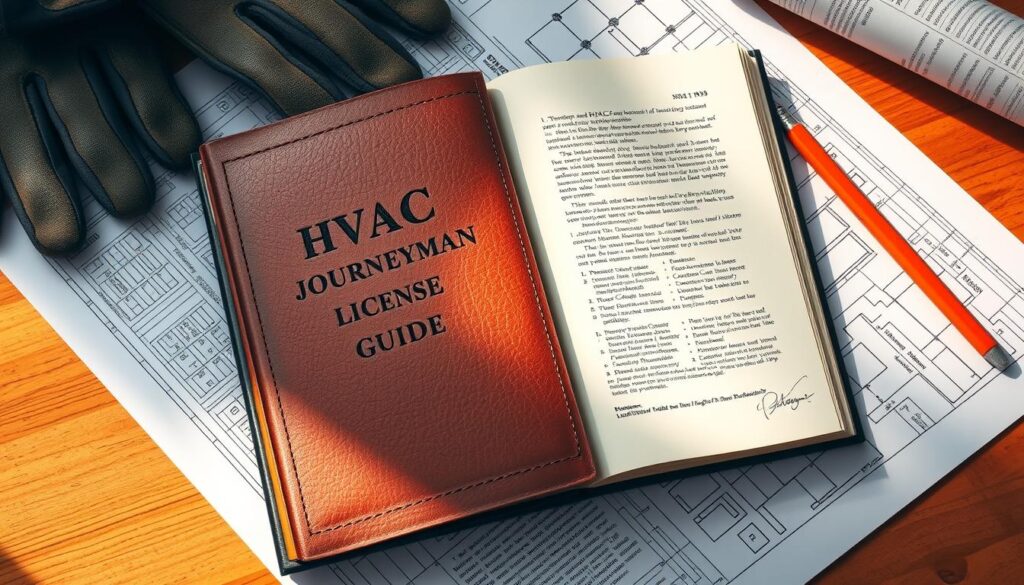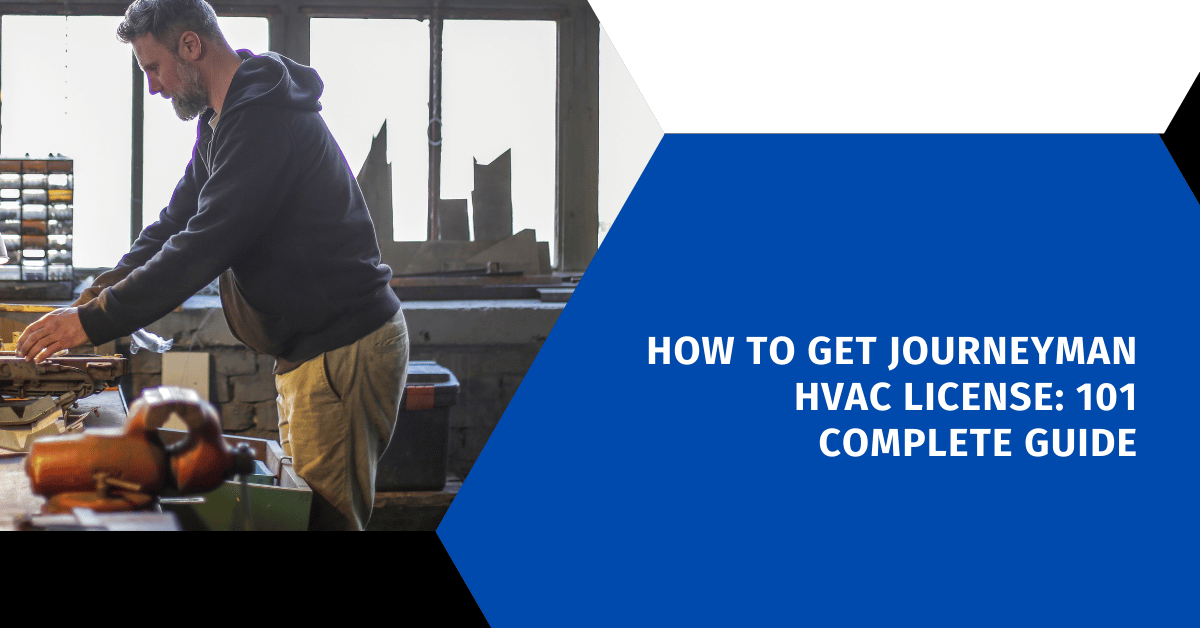Affiliate Disclosure
HVAC Guide Guys is a participant in the Amazon Services LLC Associates Program, an affiliate advertising program designed to provide a means for sites to earn advertising fees by advertising and linking to Amazon.
How to Get Journeyman HVAC License? The HVAC industry is growing fast. The U.S. Bureau of Labor Statistics says it will grow by 4% by 2029. Getting your HVAC journeyman certification is more than a piece of paper. It’s your key to professional credibility and career growth.

Are you ready to unlock a lucrative career in the heating, ventilation, and air conditioning industry? What makes a skilled professional different from an amateur in HVAC? The answer is getting your journeyman HVAC license.
Learning how to get your journeyman HVAC license means following a path of education, training, and certification. This guide will take you through every step. It will help you turn your passion into a respected technical career.
Key Takeaways
- HVAC journeyman licensing validates professional expertise
- Certification opens doors to higher-paying job opportunities
- State requirements vary for HVAC licensing
- Proper training is crucial for successful certification
- Continuous learning maintains professional relevance
Table of Contents
Understanding HVAC Licensing Requirements and Certification
Getting into HVAC licensing can seem tough, but knowing the basics is key. Getting certified shows you’re serious and skilled, leading to more job chances.
Getting certified in HVAC is tough. It shows you know your stuff. First, learn about the levels of certification in the field.
Types of HVAC Licenses Available
- Apprentice License: For newbies
- Journeyman License: For those in the middle
- Master Technician License: For the top pros
Explore Our HVAC Shop
Looking for top-rated HVAC tools, parts, and accessories? Visit our shop and find the perfect solution for your needs.
Visit the ShopCertification vs. Licensing: Key Differences
Certification and licensing are not the same in HVAC. Certification proves your skills through tests. Licensing lets you work legally.
“Professional certification is your passport to credibility in the HVAC industry.” – HVAC Industry Expert
EPA Section 608 Certification Requirements
The EPA Section 608 is key for working with refrigerants. You need to study hard for this exam. Most places require it to work on cooling systems.
To keep your skills sharp, you must take continuing education courses. These keep you up-to-date with new tech and rules.
| Certification Type | Key Requirements | Renewal Period |
|---|---|---|
| Type I (Small Appliances) | Core exam | Every 2 years |
| Type II (High Pressure) | Practical skills test | Every 2 years |
| Type III (Low Pressure) | Technical knowledge exam | Every 2 years |
Keep growing by learning and getting certified. It’s all about staying informed and skilled.
How to Get Journeyman HVAC License
Getting a journeyman HVAC license takes hard work and planning. The journey from apprentice to journeyman has key steps. These show your skills and dedication to the trade.
To get a journeyman HVAC license, follow a set path. It includes:
- Completing an approved apprenticeship program
- Accumulating required work experience hours
- Passing comprehensive licensing examinations
- Meeting state-specific certification requirements
The steps to become a journeyman vary by state. But, most need 4-5 years of work experience. During this time, you’ll learn by doing, under the watch of licensed pros.
| Requirement | Typical Duration | Key Components |
|---|---|---|
| Apprenticeship | 4-5 years | On-the-job training |
| Classroom Education | 144 hours/year | Technical and safety training |
| Work Hours | 8,000-10,000 hours | Supervised practical experience |
When aiming for a journeyman HVAC license, focus on both theory and practice. Successful candidates know a lot about HVAC systems, refrigeration, electrical systems, and safety.
The licensing exam tests your knowledge of system design, installation, troubleshooting, and local codes. Studying, practicing, and gaining experience will boost your success chances.
Explore Our HVAC Shop
Looking for top-rated HVAC tools, parts, and accessories? Visit our shop and find the perfect solution for your needs.
Visit the ShopEducational Prerequisites for HVAC Licensure
Getting an HVAC journeyman certification needs careful planning and the right education. Your journey to becoming a skilled HVAC technician begins with knowing the key educational steps. These steps will lay the foundation for your career.
High School Diploma or GED Foundation
Your journey to becoming an HVAC journeyman starts with a high school diploma or GED. These basic credentials show you have the skills needed for more advanced training.
- Most HVAC programs require a high school diploma or GED.
- They show you have basic math and communication skills.
- They are the first step towards more technical education.
Trade School and Community College Programs
Getting into HVAC often means formal technical education. Trade schools and community colleges offer programs that mix theory with practical skills.
| Program Type | Duration | Key Benefits |
|---|---|---|
| Trade School Certificate | 6-12 months | Focused technical training |
| Associate Degree | 2 years | Comprehensive technical education |
Apprenticeship Training Options
Apprenticeships are a great way to get practical experience. They mix classroom learning with hands-on training, letting you earn while you learn.
- They usually last 3-5 years.
- You’re supervised by experienced HVAC pros.
- You earn wages during training.
- They’re a direct path to journeyman certification.
Choosing the right education depends on your goals, local rules, and how you learn best. Quality education is the first step to a successful HVAC career.
Work Experience and Training Requirements

To become a licensed journeyman HVAC technician, you need a lot of hands-on experience. Your journey from apprentice to professional involves meeting certain requirements. These show your skills and knowledge in the field.
Most states require aspiring HVAC technicians to complete an apprenticeship program. These programs give you practical training and essential skills for the HVAC industry.
- Minimum experience: 4 years of documented work in the preceding 10 years
- Supervised training under licensed HVAC contractors
- Exposure to residential, commercial, and industrial HVAC systems
- Documented proof of technical skill development
The steps from HVAC apprentice to journeyman involve learning new skills. During your apprenticeship, you’ll become an expert in:
- System installation techniques
- Electrical and mechanical troubleshooting
- Complex equipment maintenance
- Safety protocols and industry standards
Your experience must show you know different HVAC systems and environments well. Employers and licensing boards want technicians who can handle various challenges.
Professional growth in HVAC requires dedication, continuous learning, and practical experience.
Each state has its own rules, so check with your local licensing board for specific requirements. Keeping detailed records of your training will help you become a licensed journeyman HVAC technician.
State-Specific HVAC Licensing Regulations
Getting an HVAC license can be tricky because each state has its own rules. It’s important to know these rules to succeed in your career and follow the law.
States have different ways of licensing HVAC pros. Some are very strict, while others are more relaxed.
Reciprocity Agreements Between States
Reciprocity agreements let HVAC pros work in many places with fewer hurdles. These deals usually include:
- Mutual recognition of professional credentials
- Streamlined application processes
- Reduced documentation requirements
“Understanding state reciprocity can significantly expand your professional opportunities.” – HVAC Industry Expert
Local vs. State Licensing Requirements
When getting an HVAC license, you need to look at both local and state rules. Important things to check include:
- Verify specific state licensing boards
- Check municipal additional requirements
- Confirm continuing education mandates
Pro tip: Always contact your state’s licensing board directly to get the most current information about HVAC professional requirements.
Explore Our HVAC Shop
Looking for top-rated HVAC tools, parts, and accessories? Visit our shop and find the perfect solution for your needs.
Visit the ShopPreparing for the HVAC Licensing Examination

Passing the HVAC licensing exam needs careful planning and deep knowledge. Your success in getting your HVAC journeyman certification depends on knowing how to study well and what to expect on the exam.
Good preparation for the HVAC licensing exam means learning both technical skills and rules. You should make a study plan that covers important HVAC parts, electrical basics, refrigeration, and safety rules.
- Create a dedicated study schedule
- Use multiple study resources
- Practice with sample exams
- Focus on complex technical concepts
- Review local and state HVAC regulations
Recommended study resources for your exam preparation include:
| Resource Type | Recommended Materials |
|---|---|
| Practice Exams | HVACR 300-question comprehensive practice test |
| Study Guides | Mike Holt’s HVAC exam preparation manual |
| Online Courses | HVAC technical certification training programs |
Managing your time during the exam is key. Plan your time well, read questions carefully, and don’t get stuck on hard problems. Remember, thorough preparation boosts your confidence and raises your chances of getting your HVAC journeyman certification.
Insurance and Bonding Requirements for HVAC Professionals
Understanding insurance and bonding is key when getting your hvac journeyman certification. It’s important for protecting your business and keeping your professional reputation strong. HVAC technicians face a lot of rules about insurance and bonding during the state hvac license application process.
Insurance helps keep your HVAC business safe from financial risks. There are three main types of insurance you need:
- General Liability Insurance
- Workers’ Compensation Insurance
- Professional Liability Coverage
General Liability Insurance Coverage
This insurance protects your business from claims of property damage or injury to others. The cost varies, usually between $500,000 to $2 million, based on your business size and local laws.
Surety Bond Requirements
Surety bonds are like a promise that you’ll do the job right. Most states ask HVAC contractors to have a bond of $10,000 to $50,000. This shows you’re serious about quality service.
Workers’ Compensation Insurance
Keeping your team safe is crucial in HVAC. Workers’ compensation insurance pays for medical bills and lost wages if an employee gets hurt on the job. Most states require this for businesses with several employees.
“Insurance isn’t an expense, it’s an investment in your professional future.” – HVAC Industry Expert
Make sure to check your state’s specific rules. Insurance needs can change a lot from one place to another.
Explore Our HVAC Shop
Looking for top-rated HVAC tools, parts, and accessories? Visit our shop and find the perfect solution for your needs.
Visit the ShopLicense Maintenance and Continuing Education
Keeping your HVAC license up to date is a big job. You need to keep learning and getting better. Most states make you take certain classes to keep your license. This helps you know the latest in your field.
Here’s what you need to do to renew your HVAC license:
- Get the right number of continuing education credits
- Pay your renewal fees
- Send in your updated info
- Show you’re still working in the field
How many credits you need changes by state. But usually, it’s between 8-16 hours every few years. These classes help you:
- Keep up with new tech
- Know about new safety rules
- Get better at your job
- Stay good at what you do
To make tracking your license renewal easier, you can:
- Keep good records of your training
- Use online tools to track your progress
- Set reminders for when you need to renew
| Renewal Aspect | Typical Requirements |
|---|---|
| Credit Hours | 8-16 hours per cycle |
| Renewal Frequency | Every 2-3 years |
| Renewal Cost | $50-$200 |
By managing your continuing education well, you stay ahead in the HVAC world. You’ll be both good at your job and follow all the rules.
Conclusion
Getting a journeyman HVAC license is a big step in your career. It takes many steps, like finishing your education and learning state rules. This is how you get your journeyman HVAC license.
Knowing the HVAC journeyman certification rules makes you stand out. By getting good training, passing tough tests, and keeping up with new knowledge, you’re ready for success. This is the foundation for growing in your career.
Every state has its own rules for getting licensed. It’s key to know these rules well. Keeping up with new tech and learning more helps you stay ahead in the HVAC field.
Start your journey now. Be determined, passionate, and focused on doing great work. Your HVAC career begins with hard work and a plan for getting certified.
FAQ
How long does it typically take to become a journeyman HVAC technician?
What are the minimum educational requirements for an HVAC journeyman license?
Do I need different licenses for residential and commercial HVAC work?
How often do I need to renew my HVAC journeyman license?
What is the EPA Section 608 Certification, and do I need it?
How much does it cost to get a journeyman HVAC license?
How long does it typically take to become a journeyman HVAC technician?
What are the minimum educational requirements for an HVAC journeyman license?
Do I need different licenses for residential and commercial HVAC work?
How often do I need to renew my HVAC journeyman license?
What is the EPA Section 608 Certification, and do I need it?
How much does it cost to get a journeyman HVAC license?
FAQ
How long does it typically take to become a journeyman HVAC technician?
Becoming a journeyman HVAC technician takes 3-5 years. This includes an apprenticeship, work experience, and passing a licensing exam. The exact time depends on your state’s rules and the training program you choose.
What are the minimum educational requirements for an HVAC journeyman license?
You need a high school diploma or GED. You must also complete an approved HVAC training program or apprenticeship. This program mixes classroom learning with hands-on training.
Do I need different licenses for residential and commercial HVAC work?
Licensing needs vary by state. Some states have one license for all types of work. Others need separate licenses. Always check with your state’s licensing board for specific rules.
How often do I need to renew my HVAC journeyman license?
Renewal periods are 1-3 years, depending on your state. You must complete continuing education credits to renew. This shows you’re up-to-date with industry standards.
What is the EPA Section 608 Certification, and do I need it?
The EPA Section 608 Certification is needed for HVAC technicians working with refrigerants. You need a Type II certification for residential and light commercial systems. You must pass an exam to get this certification, separate from your journeyman license.
How much does it cost to get a journeyman HVAC license?
Costs range from
FAQ
How long does it typically take to become a journeyman HVAC technician?
Becoming a journeyman HVAC technician takes 3-5 years. This includes an apprenticeship, work experience, and passing a licensing exam. The exact time depends on your state’s rules and the training program you choose.
What are the minimum educational requirements for an HVAC journeyman license?
You need a high school diploma or GED. You must also complete an approved HVAC training program or apprenticeship. This program mixes classroom learning with hands-on training.
Do I need different licenses for residential and commercial HVAC work?
Licensing needs vary by state. Some states have one license for all types of work. Others need separate licenses. Always check with your state’s licensing board for specific rules.
How often do I need to renew my HVAC journeyman license?
Renewal periods are 1-3 years, depending on your state. You must complete continuing education credits to renew. This shows you’re up-to-date with industry standards.
What is the EPA Section 608 Certification, and do I need it?
The EPA Section 608 Certification is needed for HVAC technicians working with refrigerants. You need a Type II certification for residential and light commercial systems. You must pass an exam to get this certification, separate from your journeyman license.
How much does it cost to get a journeyman HVAC license?
Costs range from $1,000 to $5,000. This includes education, training, exam fees, and licensing. Prices vary by state and program.
Can I transfer my HVAC license to another state?
License transfer rules vary by state. Some states have agreements for easy transfers. Others require meeting their licensing needs or passing exams.
What types of insurance do I need as a journeyman HVAC technician?
You need general liability and workers’ compensation insurance. Some states and employers also require a surety bond. These insurances protect against damages, injuries, or financial losses.
How difficult is the HVAC journeyman licensing exam?
The exam is challenging, covering technical knowledge and safety. Most exams have a 60-70% pass rate. Good preparation through study guides and training programs can help you pass.
What continuing education is required to maintain my license?
Continuing education needs vary by state, from 4-16 hours per renewal cycle. These courses keep you updated on new technologies and safety regulations.
,000 to ,000. This includes education, training, exam fees, and licensing. Prices vary by state and program.
Can I transfer my HVAC license to another state?
License transfer rules vary by state. Some states have agreements for easy transfers. Others require meeting their licensing needs or passing exams.
What types of insurance do I need as a journeyman HVAC technician?
You need general liability and workers’ compensation insurance. Some states and employers also require a surety bond. These insurances protect against damages, injuries, or financial losses.
How difficult is the HVAC journeyman licensing exam?
The exam is challenging, covering technical knowledge and safety. Most exams have a 60-70% pass rate. Good preparation through study guides and training programs can help you pass.
What continuing education is required to maintain my license?
Continuing education needs vary by state, from 4-16 hours per renewal cycle. These courses keep you updated on new technologies and safety regulations.

